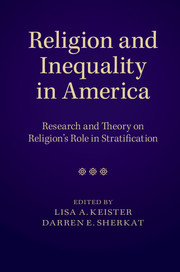Book contents
- Frontmatter
- Contents
- Contributors
- Acknowledgments
- Foreword
- Introduction
- Part I Education
- Part II Income, Wealth, and the Labor Market
- Part III Attitudes, Cultural Capital, and Power
- 7 Religion and Gender Inequality
- 8 Social Reproduction and Religious Stratification
- 9 God in the Corner Office?
- 10 The Religious Affiliations of Ivy League Presidents, 1636–2012
- Part IV Health and Well-Being
- Part V Inequality and Religion
- Index
- References
9 - God in the Corner Office?
How Religion Advances and Inhibits Professional Mobility in the Higher Circles
Published online by Cambridge University Press: 05 June 2014
- Frontmatter
- Contents
- Contributors
- Acknowledgments
- Foreword
- Introduction
- Part I Education
- Part II Income, Wealth, and the Labor Market
- Part III Attitudes, Cultural Capital, and Power
- 7 Religion and Gender Inequality
- 8 Social Reproduction and Religious Stratification
- 9 God in the Corner Office?
- 10 The Religious Affiliations of Ivy League Presidents, 1636–2012
- Part IV Health and Well-Being
- Part V Inequality and Religion
- Index
- References
Summary
Twenty years ago, Roger Friedland and Robert Alford (1991) identified ways in which different institutional sectors reflect their own “logics of action,” emphasizing the different bases of evaluation and the predominance of different action-orientations in particular contexts. For instance, people tend to be more cognitive action-oriented in the marketplace, affective in the family, and evaluative in religion. Society comprises several different institutional orders, they argue, each with a central logic even as they also acknowledge the lack of coherence because of cultural bricolage and institutional differentiation. Conflict occurs when different institutional orders contradict one another.
At the same time, we have witnessed a confluence of institutional orders coming into greater contact with one another. One such development involves the interaction between religion and politics, where scholars have found religion becoming a potent force in areas such as public policy debates, voter mobilization, and presidential rhetoric (Manza and Brooks 1997; Williams 1994). At the same time as these developments have occurred, a more significant, albeit less studied, relationship between religion and the workplace has emerged. President Clinton issued an executive order in 1997 that sanctioned religious expression in the federal workplace. In essence, the directive said that federal employees could engage in religious expression to the same extent that they were permitted to engage in comparable, nonreligious private expression in the federal workplace. Once that became standard for the federal workforce, corporate America quickly followed suit. Today, if a firm allows a group of employees to host a monthly book club over lunch in the company's conference room, it must also allow Torah lessons in the same venue (such as those offered at American Express and Ernst & Young through the “Corporate Torah Entitlement Program”). If employees are allowed to post cartoons and family pictures in their cubicles, they are also permitted to post Bible verses. The guidelines even sanctioned evangelism in the workplace: “Some religions encourage adherents to spread the faith at every opportunity, a duty that can encompass the adherent's workplace. As a general matter, proselytizing is as entitled to constitutional protection as any other form of speech.” For the first time in 1997, bringing one's faith to work was government sanctioned; the American workplace has not been the same since.
- Type
- Chapter
- Information
- Religion and Inequality in AmericaResearch and Theory on Religion's Role in Stratification, pp. 219 - 239Publisher: Cambridge University PressPrint publication year: 2014



